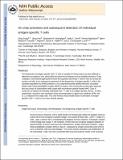On-Chip Activation and Subsequent Detection of Individual Antigen-Specific T Cells
Author(s)
Song, Qing; Han, Qing; Bradshaw, Elizabeth M.; Kent, Sally C.; Raddassi, Khadir; Nilsson, Bjorn; Nepom, Gerald T.; Hafler, David A.; Love, J. Christopher; ... Show more Show less
DownloadLove_On-chip activation.pdf (485.7Kb)
PUBLISHER_POLICY
Publisher Policy
Article is made available in accordance with the publisher's policy and may be subject to US copyright law. Please refer to the publisher's site for terms of use.
Terms of use
Metadata
Show full item recordAbstract
The frequencies of antigen-specific CD4+ T cells in samples of human tissue have been difficult to determine accurately ex vivo, particularly for autoimmune diseases such as multiple sclerosis or type 1 diabetes. Conventional approaches involve the expansion of primary T cells in vitro to increase the numbers of cells, and a subsequent assessment of the frequencies of antigen-specific T cells in the expanded population by limiting dilution or by using fluorescently labeled tetramers of peptide-loaded major histocompatibility complex (MHC) receptors. Here we describe an alternative approach that uses arrays of subnanoliter wells coated with recombinant peptide-loaded MHC class II monomers to isolate and stimulate individual CD4+ T cells in an antigen-specific manner. In these experiments, activation was monitored using microengraving to capture two cytokines (IFNγ and IL-17) released from single cells. This new method should enable direct enumeration of antigen-specific CD4+ T cells ex vivo from clinical samples.
Date issued
2009-12Department
Massachusetts Institute of Technology. Department of Chemical Engineering; Massachusetts Institute of Technology. Department of Mechanical EngineeringJournal
Analytical Chemistry
Publisher
American Chemical Society
Citation
Song, Qing, Qing Han, Elizabeth M. Bradshaw, Sally C. Kent, Khadir Raddassi, Björn Nilsson, Gerald T. Nepom, David A. Hafler, and J. Christopher Love. On-Chip Activation and Subsequent Detection of Individual Antigen-Specific T Cells. Analytical Chemistry 82, no. 2 (January 15, 2010): 473-477.
Version: Author's final manuscript
ISSN
0003-2700
1520-6882